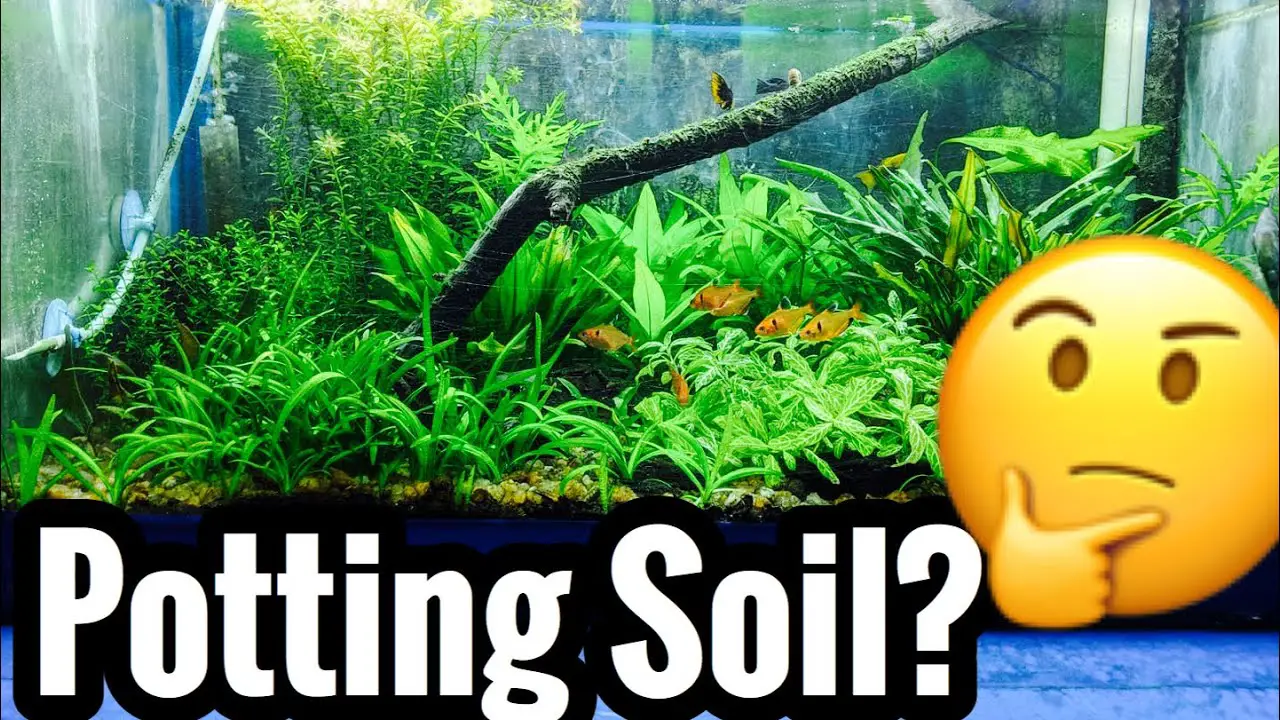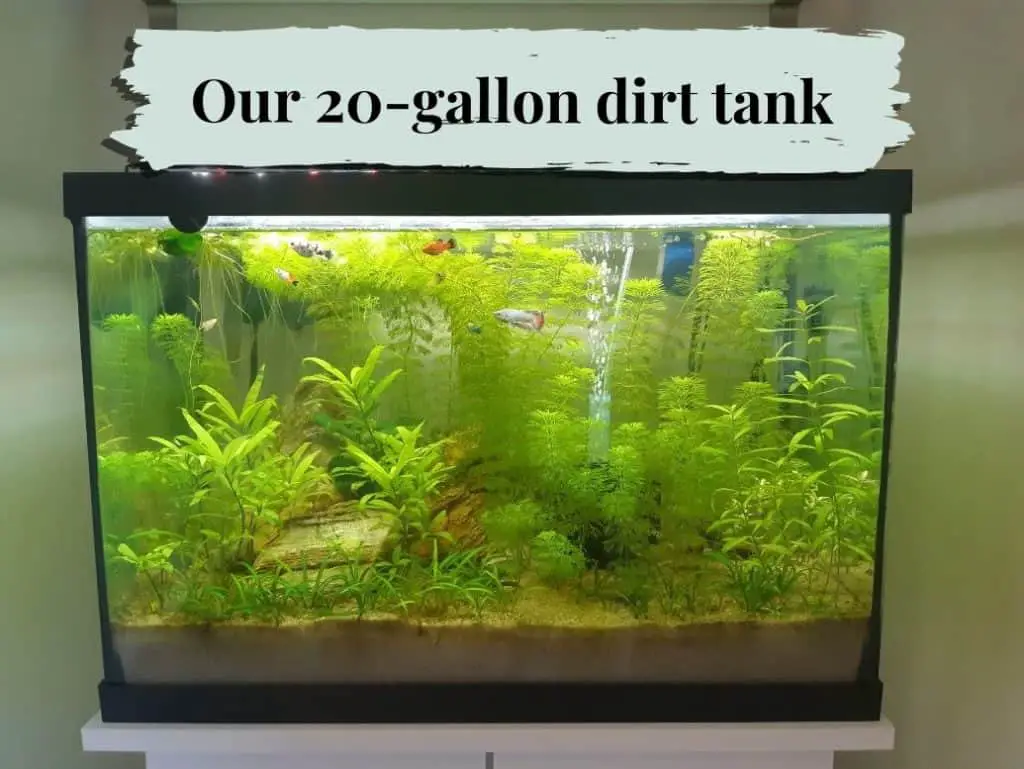Aquariums are a great way to bring a slice of aquatic life into your home, but choosing the right substrate can be a daunting task. One option that has been gaining popularity among aquarium enthusiasts is organic potting soil. But the question remains, can you really use it in your aquarium? In this article, we will explore the benefits and drawbacks of using organic potting soil in your aquarium, and help you make an informed decision for your aquatic pets. So, let’s dive in and explore this fascinating topic!

Can You Use Organic Potting Soil in Your Aquarium?
If you’re an aquarium enthusiast, you may be wondering if you can use organic potting soil in your aquarium. While it’s true that organic potting soil can be used to grow aquatic plants, it’s important to understand the risks and benefits before adding it to your aquarium. In this article, we’ll explore the pros and cons of using organic potting soil in your aquarium, and provide some tips for using it safely.
What is Organic Potting Soil?
Organic potting soil is a soilless growing medium that is specifically designed for growing plants in containers. It’s made up of a combination of organic materials, such as peat moss, compost, and perlite, which provide nutrients and support for plant growth. Organic potting soil is typically free of synthetic fertilizers and pesticides, making it a popular choice for organic gardening.
Benefits of Using Organic Potting Soil in Your Aquarium
Using organic potting soil in your aquarium can provide a number of benefits, including:
- Improved plant growth: Organic potting soil contains a variety of nutrients that can help aquatic plants grow faster and healthier.
- Cost-effective: Compared to other aquarium substrates, organic potting soil is relatively inexpensive.
- Environmentally friendly: Since organic potting soil is made from natural materials, it’s a more sustainable choice than synthetic substrates.
Drawbacks of Using Organic Potting Soil in Your Aquarium
While there are benefits to using organic potting soil in your aquarium, there are also some drawbacks to consider, including:
- Potential for cloudiness: Organic potting soil can release particles into the water, which can make it cloudy and reduce visibility.
- Risk of toxic substances: Some organic potting soils may contain harmful substances, such as heavy metals or pesticides, that can be harmful to aquatic life.
- Difficulty maintaining pH levels: Organic potting soil can lower the pH levels in your aquarium, which can be difficult to balance and maintain.
Using Organic Potting Soil in Your Aquarium
If you decide to use organic potting soil in your aquarium, there are some important things to keep in mind to ensure the safety and health of your aquatic plants and fish.
Preparing the Soil
Before adding organic potting soil to your aquarium, it’s important to prepare it properly. This involves rinsing the soil thoroughly to remove any dirt or debris, and then soaking it in water for several days to allow any harmful substances to leach out.
Adding the Soil to Your Aquarium
Once the soil is prepared, you can add it to your aquarium. It’s important to add a layer of sand or gravel on top of the soil to prevent it from clouding the water. You should also avoid disturbing the soil once it’s in the aquarium to prevent particles from being released into the water.
Maintaining the Aquarium
After adding organic potting soil to your aquarium, it’s important to monitor the water quality closely. This includes testing the pH levels regularly and making adjustments as needed. You should also keep an eye out for any signs of toxicity or stress in your fish and plants.
Conclusion
In conclusion, organic potting soil can be used in aquariums, but it’s important to understand the risks and benefits before doing so. While it can provide a cost-effective and environmentally friendly substrate for aquatic plants, it can also be harmful if not prepared and used properly. By following the tips and precautions outlined in this article, you can safely use organic potting soil in your aquarium and enjoy the benefits of healthy and vibrant aquatic plants.
Frequently Asked Questions
Can You Use Organic Potting Soil in Your Aquarium?
Yes, you can use organic potting soil in your aquarium. However, it is important to note that not all organic potting soils are created equal. You need to choose a potting soil that is specifically designed for use in aquariums. These types of potting soils are free from harmful chemicals and additives that can be harmful to your fish and plants.
When using organic potting soil in your aquarium, it is important to prepare it properly. You should rinse the soil thoroughly to remove any dirt, debris, or contaminants. You should also soak the soil in water for a few days to allow any excess nutrients to leach out. Once the soil is prepared, you can add it to your aquarium and begin planting.
What Are the Benefits of Using Organic Potting Soil in Your Aquarium?
There are several benefits to using organic potting soil in your aquarium. Firstly, organic potting soil contains nutrients that are beneficial for your aquatic plants. These nutrients can help your plants to grow and thrive, which in turn can help to create a healthy and balanced ecosystem in your aquarium.
Secondly, organic potting soil is a natural and environmentally friendly option for your aquarium. Unlike synthetic fertilizers, organic potting soil does not contain harmful chemicals that can be harmful to your fish and plants. It is also biodegradable, which means that it will break down naturally over time and will not harm the environment.
Can Organic Potting Soil Be Used in a Saltwater Aquarium?
Yes, organic potting soil can be used in a saltwater aquarium. However, it is important to note that saltwater aquariums have different requirements than freshwater aquariums. If you are using organic potting soil in a saltwater aquarium, you should make sure that it is prepared properly and that it does not contain any harmful chemicals or additives.
When using organic potting soil in a saltwater aquarium, it is important to monitor the water quality closely. Saltwater aquariums require a delicate balance of salinity, pH, and other factors. Make sure that your water parameters are within the appropriate range and adjust them as necessary.
How Often Should You Add Organic Potting Soil to Your Aquarium?
You should only add organic potting soil to your aquarium when you are setting it up or when you are replanting. Adding soil too frequently can cause a buildup of nutrients and can lead to algae growth and other problems. Instead, focus on maintaining the health and balance of your aquarium through regular water changes and appropriate feeding and care of your fish and plants.
If you do need to add more soil to your aquarium, make sure that you prepare it properly and that you do not add too much. Overloading your aquarium with soil can cause problems with water quality and can harm your fish and plants.
Are There Any Risks to Using Organic Potting Soil in Your Aquarium?
There are some risks to using organic potting soil in your aquarium. If the soil is not prepared properly, it can contain harmful chemicals or contaminants that can be harmful to your fish and plants. It can also lead to problems with water quality and can cause algae growth or other issues.
To minimize these risks, it is important to choose a high-quality organic potting soil that is specifically designed for use in aquariums. You should also prepare the soil properly and monitor your water quality closely to ensure that your aquarium remains healthy and balanced.

Setup a Fish Aquarium Using Dirt Potting Soil
In conclusion, using organic potting soil in your aquarium is a possibility, but it requires careful consideration and preparation. The soil must be free of any additives, pesticides, and fertilizers that could harm aquatic life. Additionally, it must be capped with a layer of sand or gravel to prevent it from clouding the water.
However, even with proper preparation, there is still a risk of the soil releasing toxins or causing pH imbalances in the water. It is important to monitor water parameters regularly and make adjustments as needed.
Ultimately, the decision to use organic potting soil in your aquarium is up to you. If done correctly, it can provide a natural and healthy environment for your aquatic pets. But if you are unsure or inexperienced, it may be best to stick with traditional aquarium substrates.
